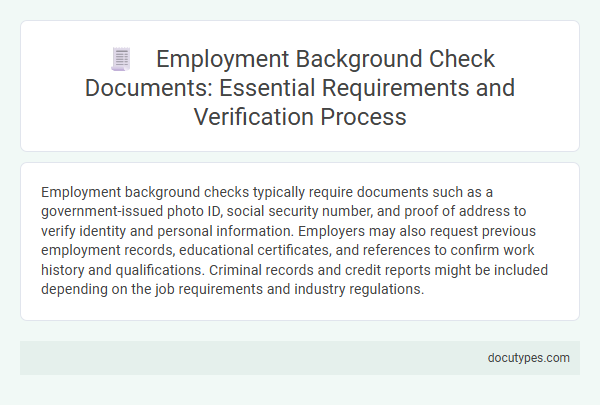Employment background checks typically require documents such as a government-issued photo ID, social security number, and proof of address to verify identity and personal information. Employers may also request previous employment records, educational certificates, and references to confirm work history and qualifications. Criminal records and credit reports might be included depending on the job requirements and industry regulations.
Introduction to Employment Background Check Documents
Employment background checks are essential for verifying a candidate's qualifications and ensuring workplace safety. These checks require specific documents to accurately assess an individual's history and credentials.
- Government-issued Identification - Valid IDs such as a driver's license or passport confirm the applicant's identity and legal eligibility to work.
- Employment History Records - Previous job titles, employment dates, and employer contact details help verify work experience and job performance.
- Educational Credentials - Diplomas, certificates, or transcripts validate academic qualifications relevant to the position.
Submitting accurate and complete documents streamlines the background check process and supports informed hiring decisions.
Importance of Background Verification in Recruitment
Employment background checks require several key documents such as a government-issued ID, social security number, and previous employment verification letters. These documents help confirm your identity, verify employment history, and assess any criminal records, ensuring the trustworthiness of candidates. Background verification plays a critical role in recruitment by minimizing hiring risks, protecting company reputation, and ensuring compliance with legal standards.
Types of Employment Background Check Documents
| Type of Document | Description | Purpose in Background Check |
|---|---|---|
| Identification Documents | Government-issued IDs such as a passport, driver's license, or state ID card. | Verify identity and eligibility to work. |
| Employment History Verification | Previous job titles, employers, and dates of employment. | Confirm work experience and job consistency. |
| Education Records | Diplomas, degrees, transcripts, or certificates. | Validate educational qualifications. |
| Criminal Background Check Authorization | Signed consent forms allowing an employer to run a criminal record check. | Ensure clearance for roles requiring security or trustworthiness. |
| Professional Licenses or Certifications | Relevant licenses or certifications needed for specialized roles. | Confirm qualifications and legal authority to perform job duties. |
| Credit Report Authorization | Consent forms for employers to access credit history, if applicable. | Assess financial responsibility for positions handling money. |
| Reference Letters or Contact Information | Names and contact details of previous supervisors or colleagues. | Gather personal performance feedback. |
| Drug Test Consent | Agreement to undergo drug testing as part of the screening process. | Ensure compliance with company drug policies. |
Government-Issued Identity Proofs
Employment background checks require specific government-issued identity proofs to verify your identity and eligibility. These documents ensure accurate and lawful hiring practices.
- Passport - A government-issued passport confirms citizenship and identity with an official photo and unique identifier.
- Driver's License - A valid driver's license provides proof of identity and residence issued by a state authority.
- State Identification Card - A state ID card serves as an official photo identification for individuals without a driver's license.
Educational Qualification Certificates
Educational qualification certificates are essential documents required during employment background checks to verify a candidate's academic credentials. Employers use these certificates to confirm the authenticity of the degrees and diplomas claimed by applicants.
Commonly requested documents include high school diplomas, college degrees, and professional certifications. Verification of these certificates helps employers ensure candidates meet the educational requirements for the job position.
Previous Employment Verification Letters
Previous Employment Verification Letters are essential documents for employment background checks as they confirm the candidate's work history. These letters provide verified details regarding job title, duration, and performance from former employers.
- Proof of Job History - Verification letters validate the specific roles and employment dates listed by candidates.
- Authentication of Experience - Employers use these letters to confirm the skills and responsibilities claimed.
- Risk Reduction - Verified employment history helps reduce hiring risks by ensuring accurate candidate information.
Criminal Record and Police Clearance Certificates
Employment background checks often require specific documents to verify a candidate's history and ensure workplace safety. Criminal record checks play a crucial role in this process by providing information about any past criminal activity.
Police clearance certificates are commonly requested to confirm the absence of criminal convictions within a specified period. These certificates serve as official proof that the individual has no relevant criminal records, facilitating trust in the hiring decision.
Professional Licenses and Certifications
Professional licenses and certifications are essential documents required during employment background checks to verify your qualifications and expertise. Employers use these credentials to confirm that you hold valid and up-to-date certifications relevant to the job position. Providing official copies or verification links of your licenses ensures a smooth and efficient background screening process.
Address Proof and Residential Verification
Address proof is a crucial document required for employment background checks to verify a candidate's current residence. Residential verification helps employers confirm the authenticity of the address provided by the applicant.
Commonly accepted address proof documents include utility bills, rental agreements, and government-issued ID cards showing the current address. Residential verification may involve physical visits, postal confirmations, or third-party database checks to authenticate the applicant's residence. These steps ensure the reliability of the candidate's background information, reducing the risk of fraudulent claims during the hiring process.
Which Documents Are Required for Employment Background Checks? Infographic

